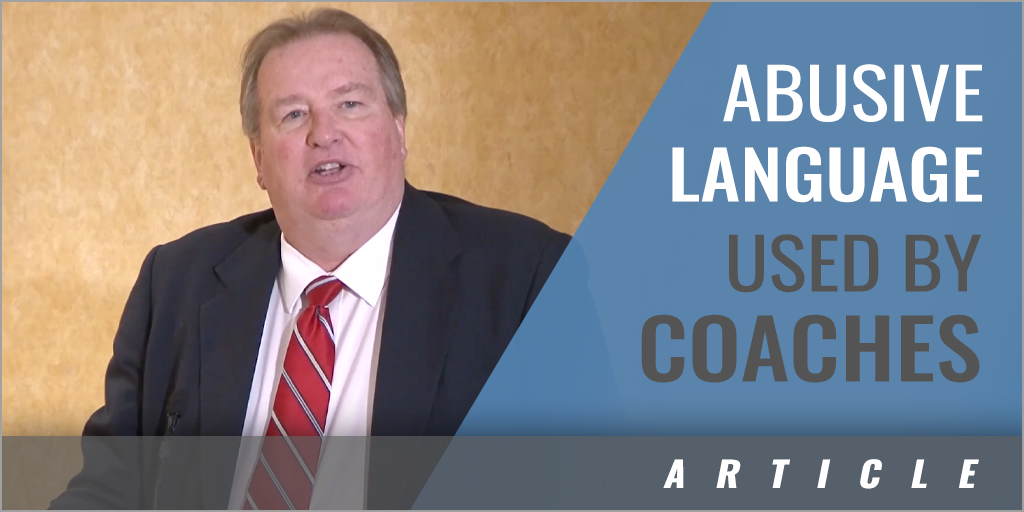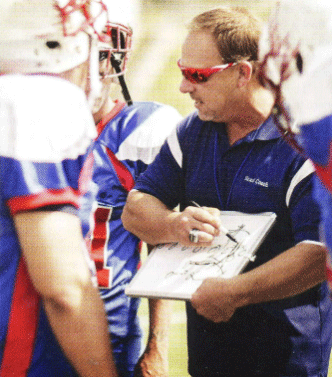|
By: Lee Green, J.D. Provided by: NFHS: High School Today Chisholm v. St. Mary's City School District In a highly unusual ruling based on an atypical analysis of the legal boundaries governing the motivational language that may be employed by high school coaches, Judge Chad Readier of the U.S. 6th Circuit Court of Appeals wrote the opinion for a divided three-judge panel in Chisholm v. St. Marys City School District. The January 2020 decision addressed the repeated use by the head football coach at St. Marys Memorial High School (Ohio) of a variety of profane and derogatory terms - most notably "pussy," "bitch," and "snowflake" - with the intent to insult and denigrate players in front of their teammates, allegedly to inspire them to play harder. The appellate court issued a ruling in favor of the district, its administrators and the coach based on Judge Readler's comparisons equating high school sports to the violent gladiator contests of Ancient Rome and his conclusion that the nature of high school football is no different from the combative aggression inherent in the National Football League - pursuits that at the secondary school level are presumably considered by the vast majority of school officials and athletics personnel across the country, in contrast to Judge Readler's analysis, to be "education-based" activities. 6th Circuit Judge John Rogers wrote a concurrence in the Chisolm case acknowledging the clearly inappropriate nature of the coach's language, but concluding that such behavior falls outside the control of the federal courts. Judge Helene N. White wrote a dissent distinguishing the coach's motivational strategies and the mission of high school athletics from those in professional sports, concluding that the abusive language in the dispute was so extreme and outrageous that it clearly fell outside the bounds of decency and as such, constituted intentional infliction of emotional distress against the young players who were victimized. Despite the fact that the defendants escaped liability, the case represents a significant standard of practice regarding the approach that should be taken by schools and athletics programs to the use of profane, vulgar and abusive language by coaches in the context of education-based sports. Background of the Chisholm Case As detailed in the 6th Circuit's written opinion, the football coach who was the focus of the case had on numerous occasions been the subject of complaints regarding abusive language directed at players, the first of which in 1995 when he was coaching at Bucyrus (Ohio) High School resulting in a written reprimand for "using unacceptable obscene language." In 1998, after taking a coaching job at St. Marys Memorial, the coach was rebuked in writing by multiple members of his own staff for subjecting players to degrading language. In 2012, as head coach at Wapakoneta (Ohio) High School, the coach was again accused of excessive harassment of players when a recording surfaced of him repeatedly directing hard-core profanity at players, including calling individual minors "pussies" and other lewd, derogatory names, with the families of several of the youngsters filing a criminal complaint against the coach and an investigation by the Ohio Department of Education resulting in a consent agreement under which he would be allowed to retain his teaching license and coaching permit in exchange for discontinuing his use of profane language and abusive behavior.
In 2014, after two winless football seasons, St. Marys Memorial rehired the coach, a decision that divided the school community with some members enthusiastically supporting the hiring based solely on the desire to win football games and others strongly opposed to the hiring because of the coach's denigrating treatment of players and disciplinary record. During his first year back at St. Marys, the coach reverted to his old ways and began directing highly profane terms at several of his players, with the added element of some of the other members of the team mimicking the coach's language, both on and off the field, to harass those players who were the direct targets of the coach's derogatory behavior. In 2015, the families of two of the victims filed a federal lawsuit against the St. Marys district, its superintendent, the high school's athletic director, and the coach. Details of the Ruling In 2018, a U.S. District Court in Ohio granted summary judgment to the defendants and that decision was appealed, with the focus of the 6th Circuit's analysis directed toward deciding whether the coach's behavior 1) violated Title IX's prohibition on sex discrimination and 2) constituted intentional infliction of emotional distress, along with evaluating 3) whether the district, its superintendent and the athletic director were vicariously liable for allowing the coach's behavior to continue. Hostile environment sex discrimination, in general and under Title IX (including same-gender harassment), has been defined by the U.S. Supreme Court as 1) unwelcome, 2) words or actions or a sexual nature, 3) so severe or pervasive, 4) that they create an objectively hostile or offensive environment. And third-parties (e.g. a district, superintendent, or athletic director) other than the direct perpetrator (e.g. a coach) will be vicariously liable when they 1) have actual knowledge of the harassment, and 2) are deliberately indifferent to remedying the situation to protect student-victims against further abuse. Judge Readler's opinion concluded, on the basis of his comparisons of high school athletes to the gladiators of Ancient Rome and professional footballers in the NFL, that the coach's profane and derogatory language - even in the setting of education-based athletics - did not violate Title IX because it was not sufficiently severe and did not create an objectively offensive environment (although he did acknowledge a likely Title IX violation if such behavior was undertaken by those in charge of other school activities such as the sponsor of a chess club or coach of a debate team). With regard to the victims' assertion, independent of Title IX, that they had suffered intentional infliction of emotional distress, Judge Readier outlined the required elements of such a claim - 1) intentional conduct, 2) that is extreme and outrageous, and 3) causes serious psychic injury - but he concluded that the coach's obscene and abusive language was not sufficiently extreme and outrageous to have resulted in serious emotional harm to its high school-age targets. Details of the Concurrence Judge John Rogers agreed with the decision to rule in favor of the defendants, but stated in his separate, concurring opinion that "this of course is not to excuse abusive conduct like that attributed to [the coach] in this case. Such conduct is not to be tolerated in our high schools. Motivation by humiliation, ridicule and shaming is counterproductive, and sends terrible messages to our young people. Good training can be very stressful, and tough - very tough - without such abuse. Moreover, constant coarse language, a sign of insecurity, engenders disrespect more often than respect." Details of the Dissent Judge Helene N. White wrote a dissent concluding that the abusive language in the dispute was so extreme and outrageous and inflicted such serious emotional harm on the plaintiffs that it clearly fell outside the bounds of decency and as such, constituted intentional infliction of emotional distress against the young players who were victimized, stating "this is not a case of a professional or collegiate football coach employing tough coaching methods to motivate consenting adults. Viewing the facts in the light most favorable to [the players targeted by the coach's abusive behavior], it appears instead that [the coach] used his position of authority to degrade, name-call, and single out minor students over an extended time and on a near-daily basis. [The coach] engaged in this name-calling in front of other impressionable students, who mimicked his behavior on and off the field ... I therefore conclude that there is sufficient evidence from which to conclude that [his] actions were so extreme and outrageous as to fall outside the bounds of decency." Recommendation School district officials should focus, during the hiring, evaluation and retention process for all athletic personnel and coaches, on ensuring that those individuals who will be serving as mentors to student-athletes steadfastly exhibit appropriate behavior consistent with the mission of education-based athletics to promote the personal growth and well-being of young people. This does not mean that coaches should be prohibited from setting high expectations and imposing demanding standards on student-athletes with regard to work ethic in training regimens, intensity of effort during practice, toughness of play in competition, resilience of attitude in dealing with the emotional ups and downs of sport participation, perseverance of mind during times of challenge in competitive endeavors, and resolve to sacrifice for the team. However, the line should be drawn - explicitly through orientation sessions provided to new coaches, in-service training programs for athletics personnel, written mandates set forth in coaching handbooks, clauses included in the paperwork used in the hiring of athletics personnel, and feedback provided orally or in writing during performance evaluations of coaches - that the use of obscene, profane or abusive language as a supposed motivational tool is strictly banned. In reality, such language and behavior is always merely a reflection of a lack of personal self-discipline on the part of the coach and has no defensible place in education-based athletics. Lee Green is an attorney and Professor Emeritus at Baker University in Baldwin City, Kansas, where for 30 years he taught courses in sports law, business law and constitutional law. He is a member of the High School Today Publications Committee. |



